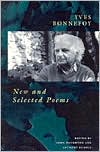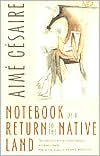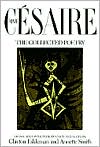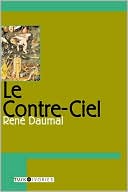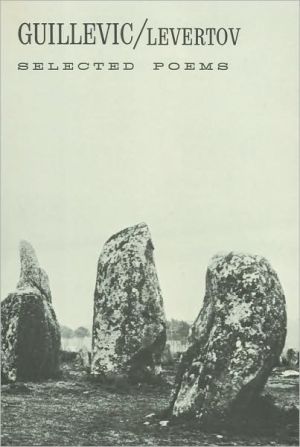New and Selected Poems
Yves Bonnefoy, celebrated translator and critic, is widely considered the most important and influential French poet since World War II. Named to the Collége de France in 1981 to fill the chair left vacant by the death of Roland Barthes, Bonnefoy was the first poet honored in this way since Paul Valéry. Winner of many awards, including the Prix Goncourt in 1987 and the Hudson Review's Bennett Award in 1988, he is the author of six critically acclaimed books of poetry.\ Spanning four decades...
Search in google:
Yves Bonnefoy, celebrated translator and critic, is widely considered the most important and influential French poet since World War II. Named to the College de France in 1981 to fill the chair left vacant by the death of Roland Barthes, Bonnefoy was the first poet honored in this way since Paul Valery. Winner of many awards, including the Prix Goncourt in 1987 and the Hudson Review's Bennett Award in 1988, he is the author of six critically acclaimed books of poetry.Spanning four decades and drawing on all of Bonnefoy's major collections, this selection provides a comprehensive overview of and an ideal introduction to his work. The elegant translations, many of them new, are presented in this dual-language edition alongside the original French. Several significant works appear here in English for the first time, among them, in its entirety, Bonnefoy's 1991 book of verse, The Beginning and the End of the Snow, the 1988 prose poem Where the Arrow Falls, and an important long poem from 1993, "Wind and Smoke." Together with poems from such classic volumes as "In the Lure of the Threshold", these new works shed light on the growth as well as the continuity of Bonnefoy's work. John Naughton's detailed introduction looks at the evolution of Bonnefoy's poetry from the 1953 publication of "On the Motion and Immobility of Douve", which immediately established his reputation as one of France's leading poets, through the 1993 publication of The Wandering Life and its centerpiece "Wind and Smoke.""This is a comprehensive selection that contains examples of work spanning [Bonnefoy's] full career of forty years, from the ground-breaking "DuMouvement et de l'Immobilité de Douve" through the celebratory "Pierre Ecrite" to the magical winter landscapes of America's East Coast and an unsettling reworking of myth in the recent "La Vie Errante" . . . The translations, which are the work of a variety of hands, including Galway Kinnell, Emily Grosholz and Anthony Rudolf, nevertheless fit well together and all are sensitive to the register and subtleties of both languages, while the introductory essay by John Naughton expertly explains Bonnefoy's importance as a poet and the influences which have shaped him. This is definitely a volume worth having, for layman and French specialist alike."—Hilary Davies, Times Literary Supplement"Anyone not familiar with Bonnefoy's work will benefit from the background information and explanations given by John Naughton in his excellent introduction . . . . The book as a whole provides an excellent introduction to Bonnefoy's poetry and to his concerns of a lifetime."—Don Rodgers, Poetry WalesPublishers WeeklyOne of the most esteemed of contemporary French poets, Bonnefoy keeps his highly philosophical poetry tangible through a detailed sense of wonder at the universe, as in his famous early poem, "Place of the Salamander'': "How I love that which awaits the hour of its victory/ And holds its breath and clings to the ground.'' Selected from six books of poetry written over four decades, many of these translations are new; much of the work—including the 1991 collection, The Beginning and the End of the Snow—is published in English for the first time. Naughton's stimulating though academic introduction outlines Bonnefoy's movement from the abstractas in his early explorations of a feminine symbol of mortality he called "Douve'' to finding more rooted, joyous inspiration from the French countryside he inhabited for years. Since the 1980s, Bonnefoy's prose poems, such as "Where the Arrow Falls", maintain in a more narrative form his unique, opulent alloy of natural imagery and existential questioning. The English and French versions face; translators besides the editors include Galway Kinnell and Richard Stamelman, all of whom have delivered the English with measured clarity. (Oct.)
ForewordIntroductionTheatre (I-XIX)/Theater (I-XIX)2Vrai Nom/True Name14"La lumiere profonde a besoin pour paraitre"/"If it is to appear, the deep light needs"14Vrai Corps/True Body16Douve parle (I-III)/Douve Speaks (I-III)18"Ainsi marcherons-nous..."/"So we will walk..."22"Qu'une place soit..."/"Let a place . . ."22Lieu de la salamandre/Place of the Salamander24Menaces du temoin (I-V)/Threats of the Witness (I-V)28Le Pont de fer/Iron Bridge34Les Guetteurs (I-II)/The Watchers (I-II)36La Beaute/Beauty38L'Imperfection est la cime/Imperfection Is the Summit38A la voix de Kathleen Ferrier/To the Voice of Kathleen Ferrier40"Aube, fille des larmes, retablis"/"Dawn, daughter of tears, restore"42Une Voix/A Voice42Delphes du second jour/Delphi, the Second Day44Ici, toujours ici/Here, Forever Here44"La voix de ce qui detruit"/"The voice of what destroys"46L'Ete de nuit (I-IX)/The Summer's Night (I-IX)50L'Ecume, Le Recif/The Foam, the Reef58"Bouche, tu auras bu"/"Mouth, you will have drunk"60"Prestige, disais-tu..."/"The spell, you said . . ."62Une Pierre ("Il desirait, sans connaitre")/A Stone ("He desired, without knowing")62Le Lieu des morts/The Place of the Dead64Une Pierre (Je fus assez belle")/A Stone ("I was quite beautiful")66Une Pierre ("Ta jambe, nuit tres dense")/A Stone ("Your leg, deepest night")68Une Pierre ("Orages, puis orages")/A Stone ("Storm after storm")68Une Voix (Nous vieillissions)/A Voice ("We grew old")70La Chambre/The Bedroom72L'Arbre, La Lampe/The Tree, the Lamp74Le Myrte/Myrtle76La Lumiere du soir/The Light of Evening78Une Voix ("Combien simples, oh fumes-nous")/A Voice ("How simple we were then")78La Lumiere, changee/The Light, Changed80Une Pierre ("Le jour au fond du jour")/A Stone ("Day at the heart of day")80La Parole du soir/Speech at Evening82Le Livre, pour viellir/The Book, for Growing Old84Art de la poesie/The Art of Poetry84La Terre/The Earth88L'Epars, L'Indivisible/The Scattered, the Indivisible (selections)112L'Adieu/The Farewell122Le Miroir courbe/The Convex Mirror126Passant aupres du feu/Passing by the Fire130Dedham, vue de Langham/Dedham, Seen from Langham132La Barque aux deux sommeils/The Boat of the Two Dreams (I-IV)140La ou retombe la fleche (1988)/Where the Arrow Falls147La Grande Neige/The Heavy Snow160Les Flambeaux/The Torches176Hopkins Forest180Le Tout, Le Rien/The Whole, the Nothingness184La Seule Rose/The Only Rose188De vent et de fumee/Wind and Smoke196Selected Bibliography205Index of Titles and First Lines209
\ Publishers Weekly - Publisher's Weekly\ One of the most esteemed of contemporary French poets, Bonnefoy keeps his highly philosophical poetry tangible through a detailed sense of wonder at the universe, as in his famous early poem, "Place of the Salamander'': "How I love that which awaits the hour of its victory/ And holds its breath and clings to the ground.'' Selected from six books of poetry written over four decades, many of these translations are new; much of the work—including the 1991 collection, The Beginning and the End of the Snow—is published in English for the first time. Naughton's stimulating though academic introduction outlines Bonnefoy's movement from the abstractas in his early explorations of a feminine symbol of mortality he called "Douve'' to finding more rooted, joyous inspiration from the French countryside he inhabited for years. Since the 1980s, Bonnefoy's prose poems, such as "Where the Arrow Falls", maintain in a more narrative form his unique, opulent alloy of natural imagery and existential questioning. The English and French versions face; translators besides the editors include Galway Kinnell and Richard Stamelman, all of whom have delivered the English with measured clarity. Oct.\ \
